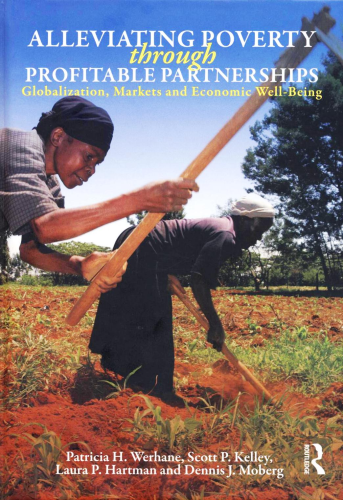Nov 05, 2009
New Book Advocates Profitable Partnerships Between Business And The World's Poor As The Solution To Poverty
New Book Advocates Profitable Partnerships Between Business And The World's Poor As The Solution To Poverty
Multinational corporations can simultaneously alleviate global poverty and reach a potentially huge yet untapped consumer and employee market if they put aside biases and team up with an atypical business partner—the world’s poor. However, to succeed, these business partnerships must be designed to be profitable, according to a new book, co-written by DePaul University professors, that provides a fresh perspective on poverty reduction.
In their book, "Alleviating Poverty Through Profitable Partnerships" (Routledge 2009), authors Patricia H. Werhane, Laura P. Hartman and Scott P. Kelley of DePaul and Dennis J. Moberg of Santa Clara (Calif.) University, draw on research by prominent business ethicists and poverty experts to conclude that the private sector holds the key to ending poverty.
The tradition of relying primarily on government aid and private philanthropy to address poverty is "flawed," the authors argue, because it is unsustainable. "Instead, companies should seek profitable partnerships with the poor for mutual gain. By developing new markets for their products and creating new jobs and opportunities for economic development, profitable partnerships hold the potential to create value for shareholders as well as for these new stakeholders," the authors conclude.
"The goal of the book is to convince companies that it is to their long-term, competitive advantage to engage in value-creatin projects in less developed countries," explained Werhane, the Wicklander Chair in Business Ethics at DePaul. "And frankly, we conclude that those companies who do not engage will not survive to 2050."
To bolster this theme, the book provides numerous examples of successful for-profit business partnerships between visionary firms and people at the base of the economic pyramid in India, Bangladesh, Mexico and Southeast Asian countries. These replicable partnership models include microfinance and secure banking services, as well as ventures that provide necessities, such as building materials, safe cooking stoves and clean water, to the poor at low cost while ensuring a profitable vested interest for the businesses involved.
Hartman, a management professor who teaches business ethics at DePaul, said this concept is a timely development for corporations seeking to find new markets and emerge from the recession. "Those at what we call the top of the economic pyramid – a very small percentage of the world’s purchasers – are tapped out. Yet, during troubled economic times, the tendency is to focus on that sector when it’s really the poor who have the market power, both because they have numbers—as many as four billion individuals live in extreme or moderate poverty—and because they have needs. It is a fundamental economic principle that unmet needs create market demand. A steady and thirsty demand exists, therefore, that will not require a philanthropic sacrifice but instead encourages profitable investment and partnership in order to generate sustainability and benefits to all stakeholders involved."
Much of the book is devoted to breaking down "mental models" that create barriers to finding for-profit remedies to poverty. The authors contend that decision-makers hold onto these narrow models—which limit options for poverty reduction to foreign aid, individual charity and corporate philanthropy—when multiple solutions exist, including profitable partnerships. "Ignoring this avenue will not only perpetuate the enduring hardships we have seen in developing economies, but also lead to continuing stagnation at the top of the economic pyramid," according to Hartman.
Among other mental models that limit poverty reduction efforts is the belief that the poor are incapable, "which leads to a perspective that the poor cannot be hired, cannot provide resources and cannot be partners," Hartman said. "But we provide examples of extraordinary human accomplishments, such as the Children’s Development Bank in India, run by and for street children, some as young as 12. The bank provides a safe place for these urban vendors to save their money. Today, the bank boasts 8,000 customers across India, and it earns a profit."
The authors acknowledge that one of the toughest challenges to the book’s premise is the assumption that any for-profit venture involving the poor would take advantage of them. "However, we believe the for-profit sector must be part of this market and, indeed, must make a profit from investment in it because profits encourage long-term commitments," Hartman explained. "Profits encourage the private sector to send valuable resources, including human resources, to these ventures and continue projects even during economic downturn."
To ensure that workers are not exploited, the authors advocate that ventures pay living wages because this raises the standard of living and lifts whole communities out of poverty. This concept is as relevant now as when Adam Smith, the father of modern economics, advocated it more than 200 years ago, according to Werhane, a pre-eminent scholar on Smith’s legacy. "As Smith wrote in "Wealth of Nations:" ‘No society can surely be flourishing and happy of which the far greater part of the members are poor and miserable. It is but equity, besides, that they who feed, clothe, and lodge the whole body of the people [i.e., laborers] should have such a share of the produce of their own labor as to be themselves tolerably well fed, clothed, and lodged.’ "
Smith’s legacy and the authors’ current research both support that "poverty alleviation is simply good business," Werhane concluded. "It’s a creative way to build an engaged community of stakeholders.
"Business needs to change its perspective on its role in addressing global poverty. The success stories we share cannot help but tug at one’s heart and plant the seeds of hope where none seemed possible."

For-profit ventures that are launched by partnerships between business and impoverished people around the world are the best way to reduce poverty, a new book co-authored by DePaul professors argues.
